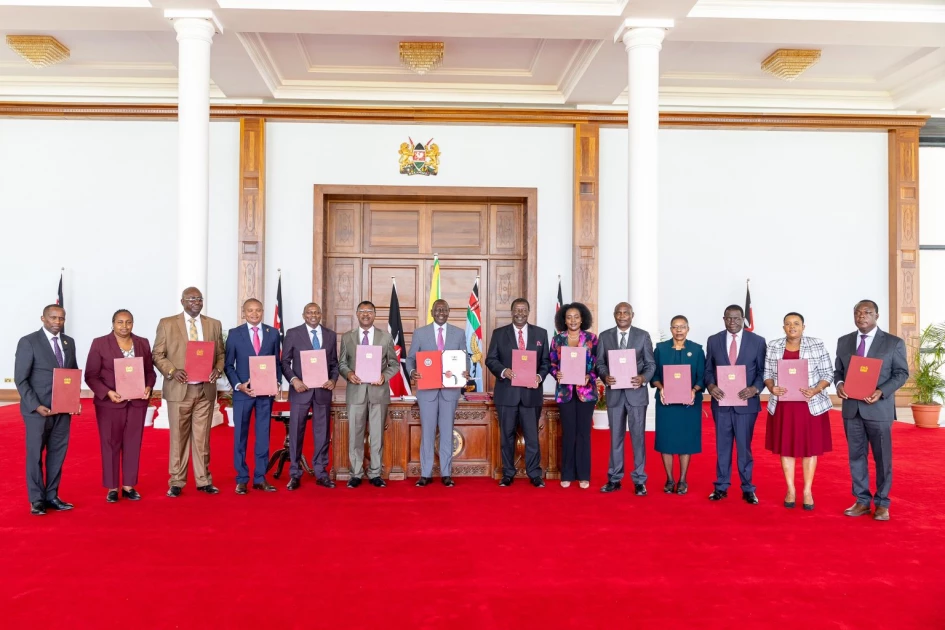President Ruto signs 7 Bills into law

President Ruto with Cabinet Secretaries and MPs at State House on December 11, 2024. Photo:PCS

Audio By Vocalize
They are the Kenya Revenue Authority (Amendment) Bill 2024, the Kenya Roads (Amendment) Bill 2024, the Ethics and Anti-Corruption Commission (Amendment) Bill 2024 and the Statutory Instruments (Amendment) Bill 2023.
Others are the Business Laws (Amendment) Bill 2024, the Tax Procedures (Amendment) Bill 2024 and the Tax Laws (Amendment) Bill 2024.
The KRA Bill 2024 provides for the appointment of deputy commissioners by the Commissioner-General. However, the appointments will be subject to the approval of the Board.
The Bill further amends the KRA Act, giving the National Treasury Cabinet Secretary power to waive the penalty payable by an appointed agent who fails to transfer funds collected if the failure was inadvertent.
The EACC Bill 2024 seeks to effect the recommendations submitted by the National Dialogue Committee on governance.
It also amends the provisions of the EACC Act prescribing the qualifications for the appointment of the chairperson of the commission.
The Bill requires that the commission chairperson be a person qualified to hold the office of a judge of the High Court.
This will enable the officeholder to offer leadership and strategic direction to the commission.
Meanwhile, the Business Laws (Amendment) Bill 2024 seeks to amend various Acts of Parliament to boost financial stability, protect depositors and promote integrity in the financial services sector.
It also promotes the ease of doing business through the amendment of the Kenya Accreditation Service Act and provides mandatory accreditation of conformity assessment institutions by the Kenya Accreditation Service.
Further, the Bill amends the Special Economic Zones Act to empower the respective Cabinet Secretary to set the minimum amount to be invested in a special economic zone and for a one-stop shop where enterprises can send all their applications for ease of doing business.
The Statutory Instruments Bill will amend the provisions of the Statutory Instruments Act, Cap 2A to require a CS responsible for a regulation-making authority that fails to submit a statutory instrument to Parliament, to publish a gazette notice nullifying the statutory instrument.
Additionally, the amendments in the Bill grant Parliament powers to publish the nullity of a statutory instrument.
Any statutory instrument contravening the provisions of the Bill will pay a minimum fine of Ksh.20,000 to a maximum of Ksh.1 million.
The Tax Procedures Bill will enhance clarity on the nature of Electronic Tax Invoices to simplify compliance for small businesses and provide incentives for the construction industry.
It dictates that such invoices should contain the designation “TAX INVOICE,” the name, address, and PIN of the supplier, and, if available, the same details for the purchaser.
Additionally, the Bill requires the inclusion of the tax invoice's serial number, issuance date and time, supply date and time if different, among other items.
The Tax Laws Bill will amend the provisions of the Income Tax Act (Cap. 470), the Value Added Tax Act (Cap. 476), the Excise Duty Act (Cap. 472) and the Miscellaneous Fees and Levies Act (Cap. 469C).
The amendments provide tax reliefs to employees and retirees, enhance benefits to employees, promote the local manufacturing sector, promote the agricultural sector and the local farmers, incentivize home ownership and promote housing and settlement, promote trade between Kenya and other States, mobilize domestic resources and enhance the taxation regulatory framework.


Leave a Comment